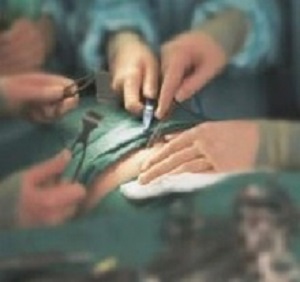 Surgery that doesn't involve the heart may cause perioperative myocardial injury (PMI) in people with known or at high risk of developing heart disease and and is strongly associated with death within 30 days afterwards, according to Swiss research.
Surgery that doesn't involve the heart may cause perioperative myocardial injury (PMI) in people with known or at high risk of developing heart disease and and is strongly associated with death within 30 days afterwards, according to Swiss research.
Heart cell damage during or after non-heart surgery is an important yet often undetected complication following non-heart surgery and is strongly associated with death within 30 days after surgery, according to research. The causes of PMI are still under investigation.
"Patients with PMI are easily missed because they show no symptoms of heart disease in the majority of cases and only very rarely experience chest pain, which is the typical symptom of heart attack," said Dr Christian Puelacher, first author of the study and a clinical researcher at Cardiovascular Research Institute Basel, in Basel, Switzerland.
To determine whether a patient's non-heart surgery damaged heart cells, researchers screened patients for PMI by measuring levels of troponin – a heart protein – in the blood before and after surgery to determine if there was injury to the heart. Troponin can indicate damage to the heart even when the patient has no symptoms. Non-heart surgeries ranged from low-risk (prostate or knee surgery) to moderate risk (hip replacement or gall bladder removal) to high risk (peripheral artery bypass or resection of a lung or the liver).
The researchers found that 1 out of 7 patients above the age of 65 or with pre-existing coronary artery disease, peripheral artery disease, or stroke developed PMI. More than 90% of PMI patients reported typical chest pain. Patients with PMI had six times more likely to die of any cause within 30 days compared to patients without PMI. The high death rate associated with PMI persisted up to one year after surgery.
The increased death rate within the first 30 days of surgery highlights that PMI is associated with death early after surgery, Puelacher said. After one year, it was clear that the patients who had high levels of troponin, meaning there was some damage to the heart from non-heart surgery, were more likely to die, and that the main increase in deaths was observed within the first weeks after surgery.
"Recognising PMI as a potential contributor to death after surgery might help improve the outcomes of non-cardiac surgery," Puelacher said. "However, since there are no clear treatment recommendations for these patients, treatment currently has to be tailored to each patient individually. Therefore, further research is needed to find optimal PMI management strategies following detection."
Patients were enrolled in the BASEL-PMI study, which is aimed at improving patient outcomes after non-cardiac surgery, focusing on heart complications in the period after surgery. From 2014 to 2015, 2,018 patients with known or at high risk of developing heart disease undergoing 2,546 non-cardiac surgeries at the University Hospital Basel in Switzerland, were included in the study.
Abstract
Background: Perioperative myocardial injury (PMI) seems to be a contributor to mortality after noncardiac surgery. Because the vast majority of PMIs are asymptomatic, PMI usually is missed in the absence of systematic screening.
Methods: We performed a prospective diagnostic study enrolling consecutive patients undergoing noncardiac surgery who had a planned postoperative stay of ≥24 hours and were considered at increased cardiovascular risk. All patients received a systematic screening using serial measurements of high-sensitivity cardiac troponin T in clinical routine. PMI was defined as an absolute high-sensitivity cardiac troponin T increase of ≥14 ng/L from preoperative to postoperative measurements. Furthermore, mortality was compared among patients with PMI not fulfilling additional criteria (ischemic symptoms, new ECG changes, or imaging evidence of loss of viable myocardium) required for the diagnosis of spontaneous acute myocardial infarction versus those that did.
Results: From 2014 to 2015 we included 2018 consecutive patients undergoing 2546 surgeries. Patients had a median age of 74 years and 42% were women. PMI occurred after 397 of 2546 surgeries (16%; 95% confidence interval, 14%-17%) and was accompanied by typical chest pain in 24 of 397 patients (6%) and any ischemic symptoms in 72 of 397 (18%). Crude 30-day mortality was 8.9% (95% confidence interval [CI], 5.7-12.0) in patients with PMI versus 1.5% (95% CI, 0.9-2.0) in patients without PMI (P<0.001). Multivariable regression analysis showed an adjusted hazard ratio of 2.7 (95% CI, 1.5-4.8) for 30-day mortality. The difference was retained at 1 year with mortality rates of 22.5% (95% CI, 17.6-27.4) versus 9.3% (95% CI, 7.9-10.7). Thirty-day mortality was comparable among patients with PMI not fulfilling any other of the additional criteria required for spontaneous acute myocardial infarction (280/397, 71%) versus those with at least 1 additional criterion (10.4%; 95% CI, 6.7-15.7, versus 8.7%; 95% CI, 4.2-16.7; P=0.684).
Conclusions: PMI is a common complication after noncardiac surgery and, despite early detection during routine clinical screening, is associated with substantial short- and long-term mortality. Mortality seems comparable in patients with PMI not fulfilling any other of the additional criteria required for spontaneous acute myocardial infarction versus those patients who do.
Authors
Christian Puelacher, Giovanna Lurati Buse, Daniela Seeberger, Lorraine Sazgary, Stella Marbot, Andreas Lampart, Jaqueline Espinola, Christoph Kindler, Angelika Hammerer, Esther Seeberger, Ivo Strebel, Karin Wildi, Raphael Twerenbold, Jeanne du Fay de Lavallaz, Luzius Steiner, Lorenz Gurke, Tobias Breidthardt, Katharina Rentsch, Andreas Buser, Danielle M. Gualandro, Stefan Osswald, Christian Mueller
[link url="https://www.sciencedaily.com/releases/2017/12/171204091202.htm"]American Heart Association material[/link]
[link url="http://circ.ahajournals.org/content/early/2017/11/29/CIRCULATIONAHA.117.030114"]Circulation abstract[/link]
